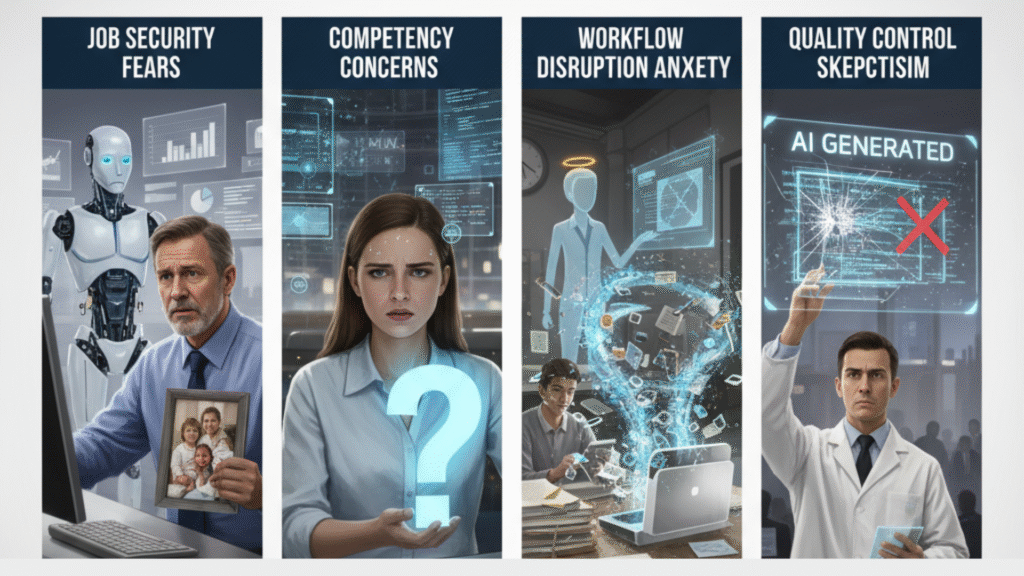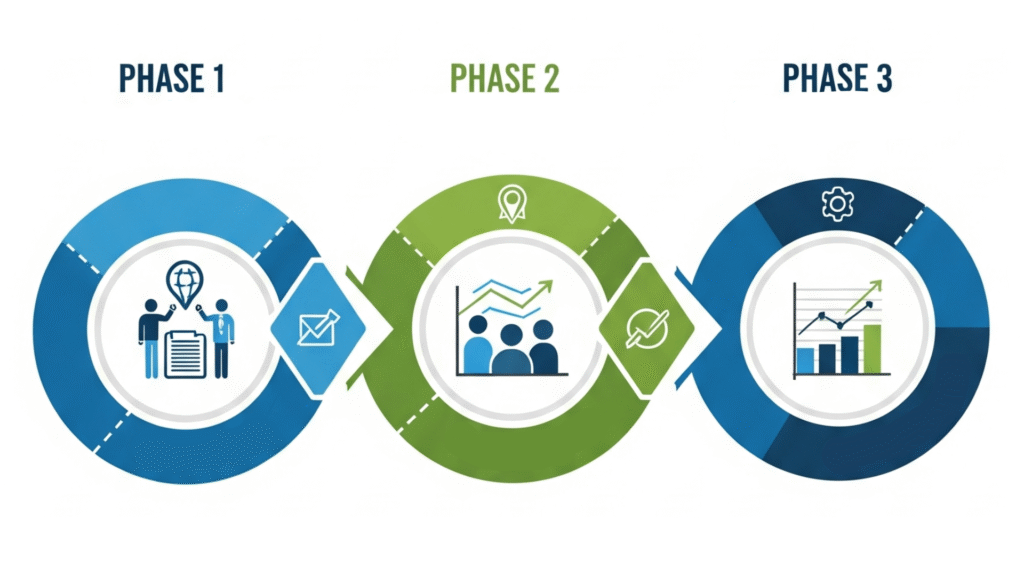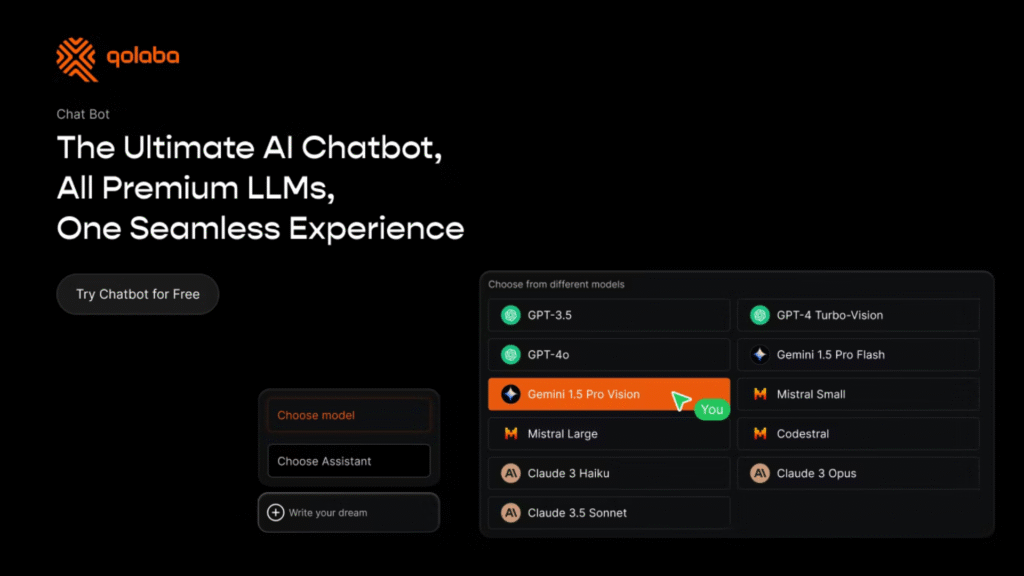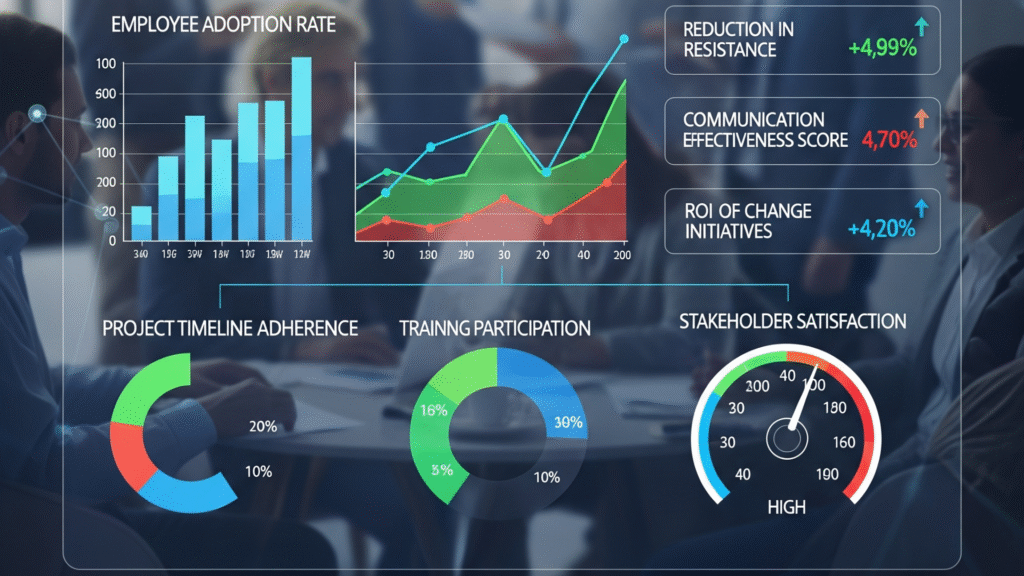Your organization invests heavily in AI tools. Leadership announces the rollout with enthusiasm. Six months later, 70% of your team still relies on old workflows while a small group of “AI enthusiasts” drives all the innovation.
This adoption gap isn’t about tool quality or training adequacy—it’s about change management failure. Successful AI adoption requires systematic approaches that address human psychology, organizational culture, and workflow integration challenges.
Research from organizational change studies shows that structured change management increases technology adoption success rates by 85% while reducing implementation timelines by 40%.
The Psychology of AI Adoption Resistance

Common Resistance Patterns
- Job Security Fears: Team members worry that AI will replace their roles or diminish their organizational value.
- Competency Concerns: Professionals fear appearing incompetent while learning new AI tools, especially in competitive work environments.
- Workflow Disruption Anxiety: Established processes feel comfortable and predictable; AI introduces uncertainty during transition periods.
- Quality Control Skepticism: Team members doubt AI output quality and worry about professional responsibility for AI-generated work.
Understanding Adoption Personalities
- Early Adopters (15%): Embrace AI tools immediately, becoming informal champions
- Early Majority (35%): Adopt AI after seeing proven success from early adopters
- Late Majority (35%): Require significant evidence and organizational support
- Laggards (15%): Resist AI adoption until absolutely necessary
Strategic Change Management Framework

Phase 1: Foundation Setting
Leadership Alignment:
- Executive Sponsorship: Visible, consistent support from organizational leadership
- Resource Commitment: Adequate budget for training, support, and implementation
- Success Definition: Clear metrics and expectations for AI adoption outcomes
- Communication Strategy: Transparent dialogue about benefits, challenges, and timelines
Phase 2: Pilot Program Implementation
Strategic Pilot Selection:
- Begin with early adopters and enthusiastic team members
- Choose AI applications with clear, measurable benefits
- Document successes, challenges, and optimization insights
Support Infrastructure:
- Training Programs: Comprehensive education tailored to different skill levels
- Technical Support: Readily available assistance for AI tool questions
- Mentorship Systems: Pair experienced AI users with newcomers
- Resource Libraries: Accessible documentation and best practice guides
Phase 3: Scaled Rollout Strategy
Phased Implementation:
- Department-by-Department: Gradual expansion allowing focused support
- Use Case Progression: Start simple, gradually introduce complex implementations
- Success Building: Leverage pilot program wins to build momentum
- Feedback Integration: Continuously improve based on team input
Resistance Management:
- Individual Attention: Personalized support for struggling team members
- Peer Influence: Leverage social proof and success stories
- Incentive Alignment: Recognition systems that encourage AI skill development
- Barrier Removal: Systematic elimination of adoption obstacles
Addressing Specific Adoption Challenges
Job Security and Role Evolution
Reframing AI as Enhancement:
- Skill Amplification: Demonstrate how AI makes professionals more capable, not replaceable
- Higher-Value Work: Show how AI handles routine tasks, freeing humans for strategic work
- Career Development: Position AI skills as valuable professional development opportunities
Role Redefinition Support:
- New Skill Development: Training programs that build AI-enhanced capabilities
- Career Path Clarity: Clear advancement opportunities for AI-proficient professionals
- Value Recognition: Acknowledge successful AI integration achievements
Workflow Integration Challenges
Gradual Process Evolution:
- Parallel Systems: Allow old and new workflows to coexist during transitions
- Incremental Changes: Small AI integrations that build confidence gradually
- Process Optimization: Systematic improvement of existing workflows through AI enhancement
Quality Assurance Systems:
- Review Processes: Clear protocols for checking and validating AI-generated work
- Responsibility Clarity: Explicit guidelines about professional accountability
- Error Management: Systematic approaches for handling AI mistakes and learning
Building AI-Positive Organizational Culture
Cultural Transformation Strategies
Innovation Encouragement:
- Experimentation Support: Safe environments for trying new AI applications
- Failure Tolerance: Understanding that AI learning involves mistakes and optimization cycles
- Creativity Celebration: Recognition for innovative AI applications and breakthrough uses
- Continuous Learning: Organizational commitment to ongoing AI education
Collaborative AI Environment:
- Knowledge Sharing: Systems for sharing AI discoveries and optimization insights
- Cross-Functional Learning: AI expertise sharing across departments
- Mentorship Programs: Structured support connecting AI-proficient members with learners
- Community Building: Internal communities focused on AI application and improvement
How Qolaba Facilitates Change Management

Adoption-Friendly Platform Design
Unified Experience:
- Single Interface: Access to 60+ AI models through one consistent platform reduces learning complexity
- Familiar Workflows: Integration patterns that minimize disruption to existing processes
- Gradual Complexity: Start simple and progressively access advanced AI capabilities
- Team Collaboration: Shared workspaces that encourage collective learning
Built-In Support Systems:
- Learning Resources: Comprehensive training materials integrated into the platform
- Usage Analytics: Insights that help teams understand adoption progress and optimization opportunities
- Best Practice Sharing: Features that enable teams to capture and distribute successful AI applications
- Technical Support: Responsive assistance for adoption challenges
Change Management Integration
Adoption Tracking:
- Usage Monitoring: Insights into individual and team AI adoption patterns
- Success Measurement: Metrics that demonstrate AI value and encourage continued adoption
- Challenge Identification: Early warning systems for adoption obstacles
- Progress Recognition: Automatic acknowledgment of AI skill development
Team Coordination:
- Collaborative Features: Shared AI workspaces that encourage peer learning
- Mentorship Facilitation: Tools connecting experienced users with learning team members
- Knowledge Management: Systems for capturing organizational AI expertise
- Change Communication: Platform features supporting change management communication
Measuring Change Management Success

Key Performance Indicators
Quantitative Metrics:
- Usage Frequency: Regular monitoring of AI tool engagement across team members
- Feature Adoption: Tracking progression from basic to advanced AI capabilities
- Productivity Improvements: Measurable enhancements in work output quality and efficiency
- Time-to-Proficiency: How quickly team members develop effective AI skills
Qualitative Assessments:
- Team Satisfaction: Regular surveys about AI tool experience and adoption support
- Resistance Reduction: Tracking changes in skepticism and adoption reluctance
- Culture Transformation: Assessment of organizational attitude shifts toward AI innovation
- Success Story Generation: Frequency and quality of AI adoption success examples
Long-Term Organizational Impact
Strategic Benefits:
- Competitive Advantage: Enhanced capabilities that differentiate the organization
- Innovation Acceleration: Increased pace of creative problem-solving
- Talent Retention: Improved job satisfaction and professional development opportunities
- Adaptability Enhancement: Organizational capacity for future technology adoption
Sustainability Indicators:
- Self-Sustaining Learning: Team members independently discovering new AI applications
- Continuous Improvement: Ongoing optimization of AI workflows and processes
- Change Readiness: Enhanced capacity for future technology transformations
- Knowledge Evolution: Progressive development of AI expertise and innovative applications
Successful AI adoption isn’t about forcing change—it’s about creating environments where change becomes natural, beneficial, and sustainable for both individuals and organizations.
Try Qolaba’s comprehensive change management support and adoption-friendly platform.





